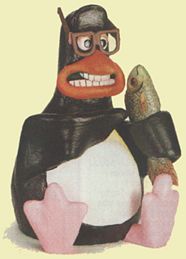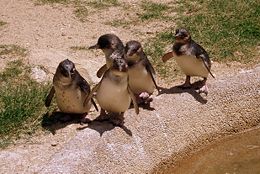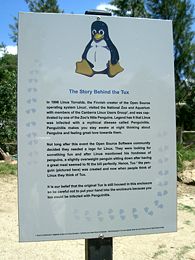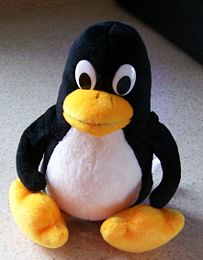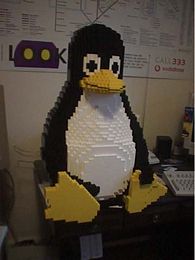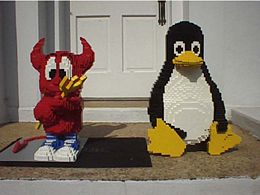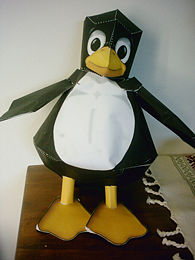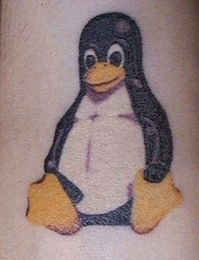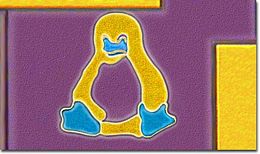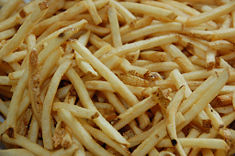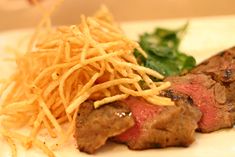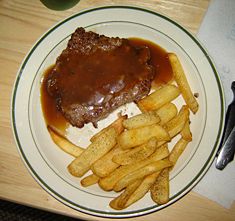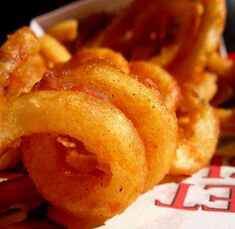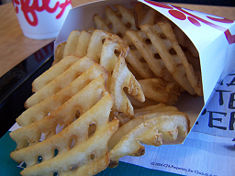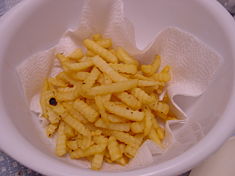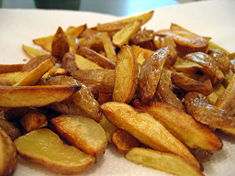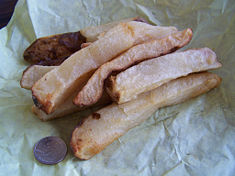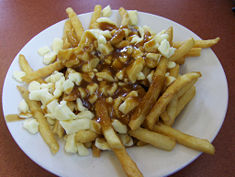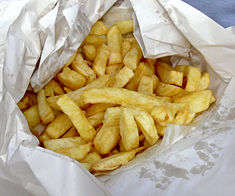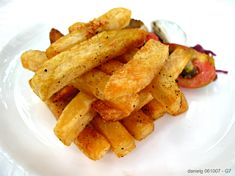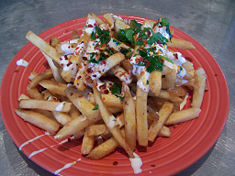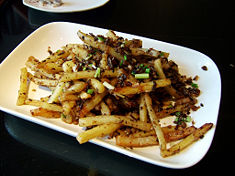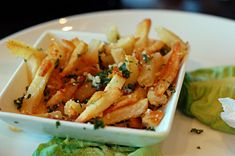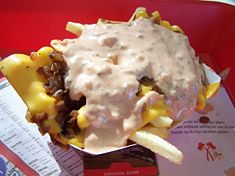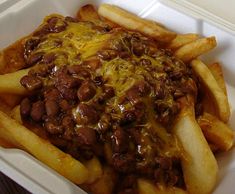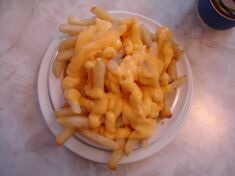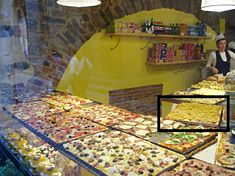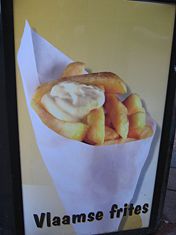imported>Stephen Ewen |
imported>Stephen Ewen |
(No difference)
|
Revision as of 00:04, 28 October 2007
The {{tl|
template shows up to 30 mixed images with captions and credit lines. The number of images possible is easily expandable.
Each image with caption is embedded in table of the same size. As a result the browser displays images row by row, with as many on one row as fit in the window.
Each credit line appears just beneath the image. The template pulls the info from Template:Name of photo.jpg/credit. For example, for Image:French_fries_closeup.jpg, the template uses the info placed at Template:French_fries_closeup.jpg/credit.
The parameters are width and lines.
The lines parameter specifies the number of lines for the captions. If for an image the text does not fit in this number of lines a vertical scroll bar appears for the caption this image. Typically this lines parameter is set depending on the width parameter and the maximum length of all captions, and such that even for users with a large font setting it is enough, since the vertical scroll bar is not convenient, but just an "emergency measure".
If a word in a caption is longer than the width of the image a horizontal scroll bar appears. The appearance of a horizontal and vertical scrollbar are independent of each other.
It uses {{Gallery-mixed/Sub}}.
Example with Tux
A subheading is possible here
|
|
|
? Image
|
The original prototype Tux. At the recommendation of Linus Torvalds, Tux is based on this very image. The penguin figurine is of an early Aardman Studios character.
|
|
|
© Image: Larry Ewing
|
The most known version of Tux, drawn by Larry Ewing as described by Linus Torvalds.
|
|
|
(CC) Photo: Navinda Kottege
|
Little Penguins at the National Zoo & Aquarium, Canberra, Australia, from where Linus Trovalds stated he caught "penguinitis" after being nibbled by one.
|
|
|
(CC) Photo: Navinda Kottege
|
Sign at the National Zoo & Aquarium, Canberra, Australia, by their penguin exhibit. The sign describes the story of Trovalds catching "penguinitis" and the origins of Tux.
|
|
|
© Image: Larry Ewing
|
An early sketch of Tux, depicting how Linux's early developers felt their operating system was geared up for competition with other operating systems.
|
|
|
(GNU) Photo: Joshua David Williams
|
|
|
|
|
© Image: Eric Harshbarger
|
A digital sculpture of Tux, by Lego.
|
|
|
© Image: Marshall Kirk McKusick
|
Another digital sculpture of Tux, this time with the BSD Daemon.
|
|
|
© Image: Molecular Expressions
|
Measuring 130 microns in size, this image is believed to be the smallest print of Tux in the world.
|
|
Example with french fries
| A subheading is possible here
|
|
|
(CC) Photo: Scott Ableman
|
Shoestring fries are prepared from peeled or unpeeled potatoes that have been cut lengthways to form about ⅓ inch (0.8 cm) strips. This is probably the most common cut within the United States.
|
|
|
(CC) Photo: Ryanne Lai Hiu Yeung
|
Petite-cut fries, sometimes called shoestring fries or potato shoestrings, are very thinly cut french fries, usually less than ¼ inch (0.6 cm) thick. Most often served in higher-end restaurants, they are nearly always prepared from peeled potatoes to convey a very "clean" appearance.
|
|
|
(CC) Photo: Mike Hipp
|
Steak fries, sometimes called ranch fries, are thick, flat-cut french fries, about 1 inch (0.6 cm) ½ inch (1.3 cm). Prepared from either peeled or unpeeled potatoes, they are often the culinary choice to convey a particularly "hearty" appearance. These steak fries have been peppered with black pepper.
|
|
|
(CC) Photo: Matthew Chastain Wright
|
Curly fries are prepared with a special cutting tool that is either motor-driven or hand-turned (see an example of motorized curly fry machine.) The cutting implement is set into one end of the potato and the potato rotated, creating the spiral shapes as seen here. Curly fries are typically lightly coated with a flour and spice mixture of salt, paprika, black pepper, and other spices before frying, the result of which can be seen in this photo.
|
|
|
(CC) Photo: Tom Spaulding
|
Waffle fries. Potatoes are cut crossways with a special tool to form the unique "waffle" shape, then prepared. These waffle fries are made by Chik-fil-A, a popular fast-food chain restaurant in the United States, who is sometimes cited as popularizing the cut.
|
|
|
(CC) Photo: Matt Chan
|
Crinkle-cut fries. Potatoes, usually peeled, are cut with a special tool to form the "crinkle" shape, then prepared. They are typically about ½ inch (1.3 cm) by ½ inch (1.3 cm). These crinkle-cut fries have have been purchased frozen from a grocery and fried at home.
|
|
|
(CC) Photo: Justin Henry
|
Wedge-cut fries are prepared from small, whole, unpeeled potatoes cut lengthways into quarters or sixths to form the wedges. As can be seen in this photo, the wedges need not be uniform. Wedge-cut fries are often prepared through oven-fry methods to produce a dish lower in fat.
|
|
|
(CC) Photo: Tom Spaulding
|
Potato log fries or simply potato logs, are prepared from very large unpeeled or peeled potatoes, often pre-cooked, that are cut about 1 inch (2.5 cm) by 1 inch (2.5 cm) to form "logs". A variant of potato logs is prepared similarly to wedge fries. Large, unpeeled, and often pre-cooked potatoes are are quartered or cut into sixths or eights lengthways to form the logs and prepared. Potato logs are sometimes prepared through various baking methods. Note the coin (U.S. quarter) in the photo for size comparison. This serving was probably made from just one extra large potato.
|
|
|
(CC) Photo: Peter Dutton
|
Poutine is a french fry dish of Quebec, Canada, origin. It consists of french fries topped with gravy (usually made of beef), and cheese curds.
|
|
|
(CC) Photo: Gary Tanner
|
Chips wrapped in paper, as customarily served in the United Kingdom. Potatoes used to prepare chips are sliced thicker than many french fry varieties, setting them apart from "french fries" in the minds of many Brits.
|
|
|
(CC) Photo: Daniel Y. Go
|
A unique french fry creation served at Antonio's Restaurant in Tagaytay City, Philippines. These have probably been prepared in drawn butter (butter with all the whey and other liquids removed) after a light coating in seasoning. Fresh chopped garlic has been added to flavor the fry medium and removed and sprinkled atop the final dish, which can be seen in the photo. Note the careful arrangement of the fries.
|
|
|
(CC) Photo: Tom Spaulding
|
|
|
|
|
(CC) Photo: Toby Oxborrow
|
A french fry dish served in Beijing, China. The potatoes have been fried, tossed in a spicy low-moisture coating, and topped with scallions.
|
|
|
(CC) Photo: Scott Kidder
|
A unique french fry dish served at an upscale restaurant.
|
|
|
(CC) Photo: Tom Spaulding
|
Animal fries are a unique offering by the In-N-Out U.S. fast-food restaurant chain. Animal fries are prepared from shoestring french fries smothered with two slices of American cheese, a "secret sauce" similar to thousand island salad dressing, and grilled onions.
|
|
|
(CC) Photo: Patrick Taillon
|
Chili fries consist of french fries topped with a generous helping of chili, a spicy bean and meat dish, sprinkled with grated cheese.
|
|
|
(CC) Photo: Jennifer Snyder
|
Cheese fries is a dish made of of french fries topped with a generous helping of cheese sauce, often made of Velveeta cheese, a processed American cheese product. Chili-cheese fries are often made, combining chili fries with cheese fries, smothering the dish with both chili and cheese. Both dishes are sometimes topped with Jalapeño peppers, onions, sour cream, fresh chopped tomatoes, and other sometime other ingredients.
|
|
|
(CC) Photo: Luigi Zanasi
|
French fry pizza (lower-middle-right) made in Abano Terme, Italy, in 2006. The usage of french fries to top pizza in Italy is one illustration of the extent to which french fries have permeated cuisines globally.
|
|

